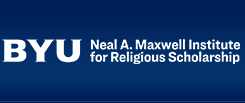Insights: The Newsletter of the Neal A. Maxwell Institute for Religious Scholarship
Keywords
Jesus, disciples, literature, semiotics, theology
Abstract
The mother tongue of Jesus and his disciples was not Greek or Latin or even Hebrew, but Aramaic, the language of Israel’s Babylonian captors. Aramaic, and in particular the dialect of Syriac, has continued to be spoken by many Christians in the Middle East and elsewhere down to the present time. This Semitic language became the vehicle for a vast body of early Christian literature that expressed Christian theology in singularly Semitic forms. For example, just as the Hebrew prophets expressed themselves primarily in poetry or rhythmic prose, rich with symbolism and analogy, so also early Syriac teachers composed didactic hymns and even their sermons in poetic meter. In contrast to the philosophical theology of western churches, Syriac Christians articulated a symbolic theology that drew on images from nature and scripture to express the Christian mysteries.
Recommended Citation
Griffin, Carl
(2009)
"Moving Syriac Literature into the Digital Age,"
Insights: The Newsletter of the Neal A. Maxwell Institute for Religious Scholarship: Vol. 29:
No.
1, Article 1.
Available at:
https://scholarsarchive.byu.edu/insights/vol29/iss1/1

